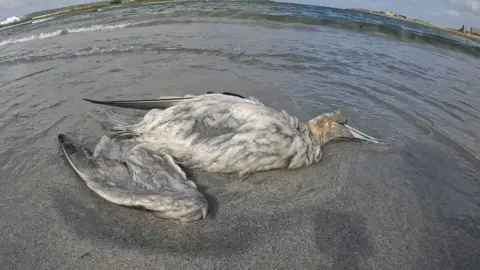RSPB calls for urgent government response to bird flu outbreak
 RSPB Scotland
RSPB ScotlandAn urgent response is needed to the outbreak of avian flu which is killing hundreds of seabirds, RSPB Scotland has said.
The charity said Shetland was the worst affected area, but there were also carcasses being found from the Mull of Galloway to St Kilda and East Lothian.
It is urging the Scottish government and nature body NatureScot to co-ordinate surveillance and testing.
About 1,000 dead gannets have so far been recorded in Shetland alone.
Large numbers of dead and dying seabirds have been seen across Scotland over the past few weeks.
There have been reports of widespread deaths at great skua colonies, as well as sick and dead gannets at key colonies, including Noss in Shetland and also Troup Head in Aberdeenshire.
Dozens of wild birds are suspected to have died from an avian flu outbreak at Loch Fleet, near Golspie in Sutherland, last month.
Tests are currently being carried out for avian flu at the world's largest colony of northern gannets on the Bass Rock in East Lothian.
It is understood that more than 150 dead sea birds have been discovered along the East Lothian coastline.
Earlier this year, bird flu cases were reported in Dumfries and Galloway, Aberdeenshire and Ayrshire.
Multiple pressures
The RSPB said Scotland has 60% of the world's population of breeding great skuas and 46% of breeding gannets.
Dr Paul Walton, head of species and habitats for RSPB Scotland, said seabirds were already facing "multiple severe pressures" including climate change and fish shortages.
"Now, a highly mutable and deadly new form of avian influenza, which originated in poultry, is killing our wild seabirds in large numbers," he said.
"We urge the Scottish government and NatureScot to develop a response plan urgently - to coordinate surveillance and testing, disturbance minimisation, carcass disposal and biosecurity."
NatureScot said in a statement it was "extremely concerned" about the current H5N1 strain of avian flu in Scotland and its potential impact on internationally important bird populations.
"NatureScot is working at speed to produce advice for our reserve managers, and with Scottish government and conservation organisations to develop an effective overall strategy," the organisation said.
Public health advice is that the risk to human health from the virus is very low.
